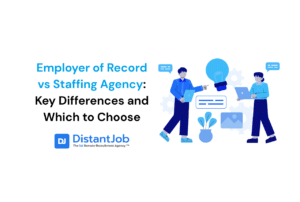Is your recruiting process agile enough to compete in the world of IT talent shortages? Seventy-five percent of companies worldwide are currently facing talent shortages, and 90% of U.S. recruiting managers struggle to find qualified candidates managers struggle to find qualified candidates. It’s even worse if you need people with specialized skill sets, such as AI, cloud computing, and cybersecurity.
But there’s a silver lining. By incorporating defined metrics, leveraging better technology, and creating a more positive candidate experience, you can transform your recruitment process into a competitive advantage. This approach will help you hire the best talent more quickly and cost-effectively.
In this article, we’ll show you how to create a recruitment process that works for you—rather than against you.
1. Be Clear About your Hiring Needs
It’s important that any job posting that you have is clear about both the position and its benefits. A 2023 LinkedIn survey found that 77% of small business owners struggled to attract qualified candidates due to unclear job requirements or overly broad job descriptions. When you’re attracting prospective employees locally or from around the world, they need to know exactly what they’re committing to before they sign on to work with your company.
Be open for in-depth questions about the job description and expectations and about your company, and expect more of a back-and-forth interview process than you’d have normally. When someone’s committing to your company for the long term, both you and they need to ensure that you’re a good match.
2. Don’t Ignore Data-Driven Recruitment Tools
The era of going with your gut is pretty much over. According to a report by LinkedIn, 47% of mid-sized companies now use predictive hiring tools. However, many companies still don’t make the most of the data available to them.
To start, consider investing in an applicant tracking system (ATS) like Greenhouse. These tools can help you measure your time to hire and identify at which stage you’re losing the most applicants. For example, if your data shows that 60% of your best hires come from specific sources, you can adjust your budget to focus more on those sources.
3. Create an Offer They Can’t Refuse
With over 70% of candidates researching companies before applying, your online presence matters more than ever. Position yourself as a company that’s breaking new ground in its field and offers a substantial and comfortable position, and you’ll attract the long-term brilliant talent you want.
One way to increase an employee’s enthusiasm and commitment to your organization is to develop unique and desirable positions for your employees. Offering company benefits, an attractive compensation package, innovative training, and flexible work hours all make your company irresistible.
4. Look Deeper
If you’re looking for someone to work on a short-term project such as designing a new brochure, you may look over a number of candidates, assess whether their work is a fit for your business, and decide on the person you’d like to work with. However, when you’re looking for an individual to bring onto your team and that individual needs a breadth and depth of specific skills, focus your time and energy on developing a larger pool of interested and qualified candidates. You have the entire world to choose from, so take this opportunity to really look at the full spectrum of hiring options. This will allow you to not only find someone whose skills are a fit, it will also allow you to find someone who works well with other employees in your organization.
5. Seek to be in Direct Connection
The 2024 Candidate Experience Awards found that companies with a clear communication plan had a 49% higher acceptance rate than those without.
An important part of the recruitment process is to keep in touch with your candidates. Even if your answer is “no,” it is much better than no answer at all. Candidates who don’t receive a response are often left with negative thoughts about your company, which could reflect in reviews.
Even a short, friendly rejection letter with a couple of positive observations can leave a good impression. This might encourage the candidate to refer others to your company in the future.
6. Focus on Cultural Addition, Not Just Fit
A recent LinkedIn survey revealed that 78% of SMB recruiters aim for diversity but fall back on familiar hiring patterns. Instead:
- Look for candidates who bring fresh perspectives
- Implement bias awareness training
- Emphasize growth opportunities
- Create inclusive hiring practices
Your employees need an intimate understanding of your organizational ethics and directions, an excellent work ethic, and a commitment to represent your company to the best of their ability. This translates into the importance of not only seeking candidates with excellent resumes and strong technical abilities but also candidates with great soft skills. Communication abilities, self-reliance, time management, among others, are skills necessary to make companies and remote teams successful.

7. Have a Solid Interview Process
One of the best tips to improve the recruitment process is having great interviews. Interviews are the foundation that determines if a candidate will be a great remote employee or not. It’s not about having a set of questions prepared and asking them the same to everyone. But it’s also about establishing a connection with candidates, knowing more of them, and their personalities.
Preparation is necessary because if you think that by improvising, you’ll get the talent you want, you’re wrong. First of all, having an interview process is to know what kind of candidate you want to hire, with what technical skills and abilities. Having this deciphered makes interviews more direct, you’ll know if you’ll need to test some skills at the moment or what questions to ask.
Also, team interviews are extremely helpful. Having other members of the company ask questions and see how the candidates answer and behave will lead all of you to discuss whether you think the candidate will make a great fit or whether it’s better to keep searching.
Whether you’re looking for your first remote worker or building a remote team of employees, DistantJob can help. We’re a remote job recruiting agency with experience in global hiring processes and remote management training. We’ll find you remote employees with the skill sets you need and who will work with your company seamlessly and integrally.





